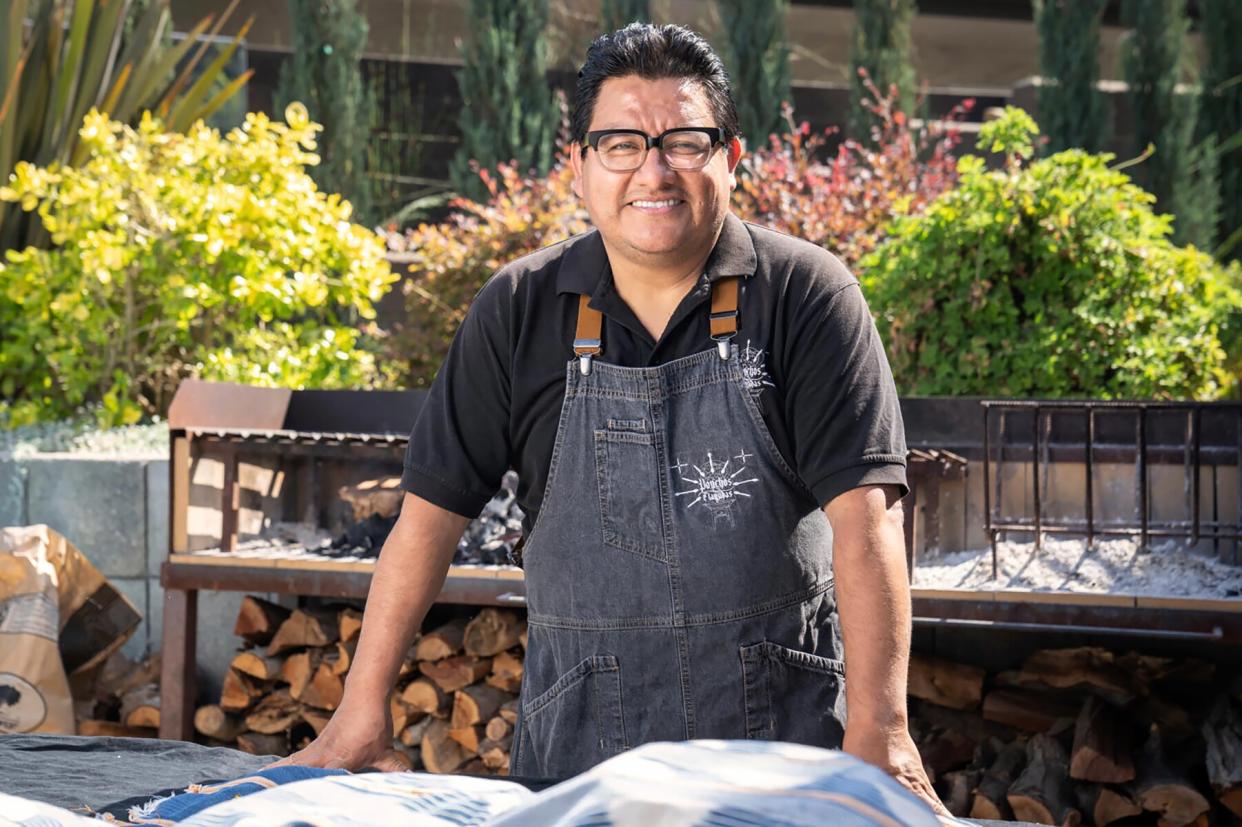How Chef Alfonso "Poncho" Martinez Combines Food and Activism to Increase Awareness of L.A.'s Indigenous Communities

Jon Endow
When the Covid-19 pandemic hit South Los Angeles, a shortage of available ingredients from Oaxaca forced Alfonso "Poncho" Martinez — known for his crunchy and savory tlayudas — to hastily pivot to tamales, made with masa from Los Angeles' beloved Kernel of Truth Organics. Though the tamales regularly sold out, tlayudas and moronga are the true paragon of Martinez's cooking. His food provides not only a through line back to Oaxaca, where he and his wife, Odilia Romero, are from, but also a critical connection to L.A.'s Indigenous communities from Mexico and Central America.
For the foundation of his tlayudas, Martinez slathers asiento, or settled fat from pork lard, on a thin corn tortilla imported from Oaxaca. Earthy black beans are then spread on top, followed by a layer of hand-shredded, buttery quesillo, a cheese from Oaxaca. Chopped cabbage and, if desired, a sprinkling of spicy, salted chorizo make for the final cover — giving it that perfect, seasoned crunch — before the tortilla is folded over and grilled over an open flame fueled by mesquite wood.
Meanwhile, the moronga, the recipe for which comes from Romero's hometown of San Bartolomé Zoogocho, is good enough to change many minds about blood sausage. It's a punchy, smoky, and slightly spicy link with an aromatic note, thanks to yerba santa. It lacks the cakey consistency and iron aftertaste that turn off so many.
Martinez is a member of the Zapotec Indigenous community from Oaxaca, and at Poncho's Tlayudas, he is recreating his traditional cultural recipes. "I started to learn when I was 11 years old, first making sopa de huevo, then salsas with the metate," he says. After moving to L.A., he held stints as a dishwasher, barista, breadmaker, and cook at UCLA and various restaurants. Tired of working unsatisfying jobs, Martinez decided to start learning recipes from Romero's father. "He taught me how to make moronga. Then I worked with Odilia's mother, who was making food for community events, and then I started to make tlayudas," he says. Thus began his tlayuda pop-up on Fridays, a new chapter in Martinez's career and, most importantly, a real family business.
Romero is the cofounder and executive director of Comunidades Indígenas en Liderazgo (CIELO), a nonprofit organization that works with Indigenous communities in L.A. They provide interpretation services in courts and hospitals, train LAPD officers to recognize Indigenous-language speakers, and, during the pandemic, they distributed food and monetary aid from the Undocu-Indigenous Fund and administered COVID-19 vaccinations. CIELO addresses the needs of Indigenous people from Mexico and Guatemala, who often get lumped in with Latin communities, even though they may have completely different needs and sometimes don't speak Spanish fluently.
"People impose their label on us. And that's very dangerous; it's deadly. If we don't have an interpreter, we could be given the wrong medication. The other day, one of my clients called me and said, 'I'm in the hospital. Someone told me that I don't need an interpreter because my son is just getting three shots.' But they don't even know the shots they are getting without one," says Romero. Similar to her husband's story, the journey to L.A. is made by many of the city's restaurant workers: "I think 46% or 47% [of the Indigenous community] works in the food industry," says Janet Martinez, cofounder and vice executive director at CIELO.
It's no coincidence that CIELO's offices sit adjacent to where Martinez hosts his tlayuda pop-up every other Friday; each tlayuda, whether accompanied by moronga or tasajo (grilled beef), increases the awareness of Indigenous people in L.A. as a vibrant, living community.
Now that his tlayudas and moronga are dialed in, Martinez is fine-tuning other recipes with the help of his sister. Her time in their mother's kitchen will enable her to help him perfect their family's dishes. Perhaps these other specialties will create even more visibility for Indigenous migrants in L.A.
Follow Poncho's Tlayudas on Instagram @ponchostlayudas or visit ponchostlayudas.com; learn how to support CIELO at mycielo.org.

